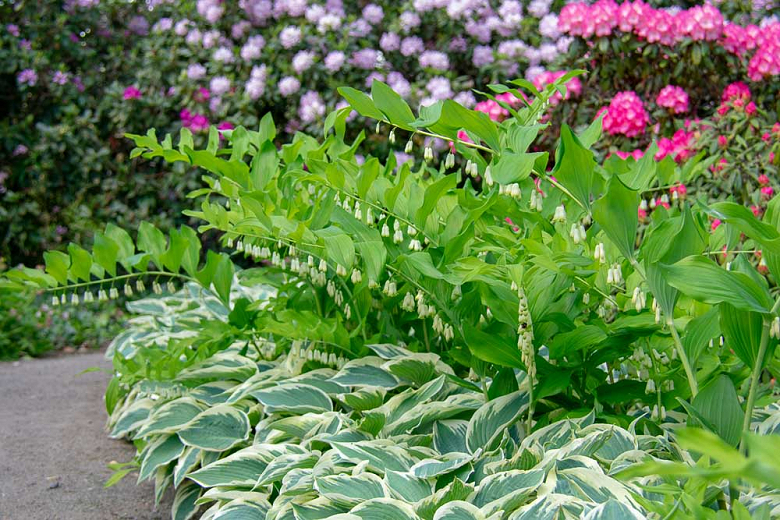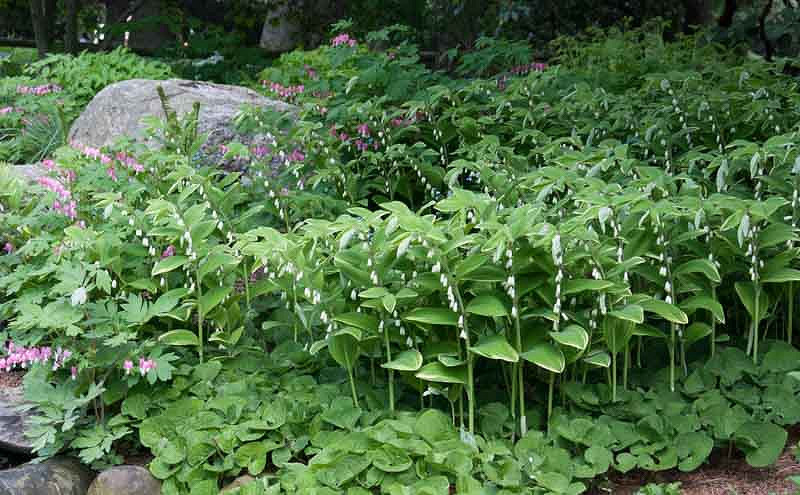Variegated Solomon's Seal: The Perfect Shadeloving Companion Plant
Variegated Solomon's Seal (Polygonatum odoratum 'Variegatum') is a beautiful and versatile perennial plant that is perfect for shady gardens. With its striking white-edged foliage and delicate white flowers, Variegated Solomon's Seal can add a touch of elegance to any shady spot.
In addition to its attractive appearance, Variegated Solomon's Seal is also relatively easy to care for. It prefers moist, well-drained soil and partial to full shade. Once established, Variegated Solomon's Seal is drought tolerant and can even withstand some periods of flooding.
Variegated Solomon's Seal is a low-maintenance plant that is perfect for busy gardeners. It does not require regular pruning or deadheading, and it is resistant to most pests and diseases.
Variegated Solomon's Seal is a great choice for companion planting. It can be planted with other shade-loving plants, such as hostas, ferns, and astilbes. It can also be planted under trees and shrubs to help fill in the shady areas under their canopy.
Variegated Solomon's Seal is a deer-resistant plant, so it is a good choice for gardens where deer are a problem. It is also a rabbit-resistant plant.
Variegated Solomon's Seal blooms in the spring, from April to June. The flowers are small and bell-shaped, and they are white with a green tip. The flowers are borne on arching stems that rise above the foliage.
After the flowers have faded, the plant produces small, black berries. The berries are not edible, but they are attractive to birds.
Variegated Solomon's Seal is a long-lived plant that can live for many years. It is a great addition to any shady garden, and it will provide years of beauty and enjoyment.
[Main Content]
Here are some additional details about Variegated Solomon's Seal:
- Plant size: Variegated Solomon's Seal typically grows to be 1-2 feet tall and wide.
- Light requirements: Variegated Solomon's Seal prefers partial to full shade. It can tolerate some direct sunlight, but too much sun will scorch the leaves.
- Soil requirements: Variegated Solomon's Seal prefers moist, well-drained soil. It can tolerate some clay soils, but it will not do well in sandy soils.
- Water requirements: Variegated Solomon's Seal needs regular watering, especially during the first year after planting. Once established, it is more drought tolerant.
- Fertilizer requirements: Variegated Solomon's Seal does not need to be fertilized often. A light application of compost in the spring will help to keep the plant healthy.
- Pests and diseases: Variegated Solomon's Seal is relatively resistant to pests and diseases. However, it can be susceptible to slugs and snails.
- Propagation: Variegated Solomon's Seal can be propagated by division in the spring or fall. It can also be propagated from seed, but this method is less successful.
[Conclusion]
Variegated Solomon's Seal is a beautiful and versatile perennial plant that is perfect for shady gardens. It is easy to care for and can add years of beauty and enjoyment to any landscape. If you are looking for a shade-loving plant that is both attractive and low-maintenance, Variegated Solomon's Seal is a great choice.
Variegated Solomon's seal is a beautiful shade-loving perennial with striking white-edged leaves. It blooms in spring with small white flowers that hang from arching stems. This plant is easy to care for and can tolerate a wide range of soil conditions.
When choosing companion plants for variegated Solomon's seal, it is important to consider the plant's needs for shade and moisture. Other shade-loving perennials that would make good companions include hostas, ferns, and lungworts. These plants will help to create a lush and inviting understory in your garden.
For a more colorful display, you could also consider planting variegated Solomon's seal with some sun-loving perennials. Some good options include coral bells, bleeding hearts, and Jacob's ladder. These plants will add a pop of color to your garden and help to extend the bloom season.
No matter what type of companion plants you choose, variegated Solomon's seal is sure to add a touch of elegance to your garden. To learn more about this plant and find a list of recommended companion plants, visit Gardenia Inspiration.
FAQ of variegated solomon's seal companion plants
- What are some good companion plants for variegated Solomon's seal?
Variegated Solomon's seal (Maianthemum racemosum 'Variegata') is a shade-loving perennial plant that prefers moist, well-drained soil. It is known for its attractive, variegated leaves and its delicate, white flowers that bloom in the spring. Some good companion plants for variegated Solomon's seal include:
* Other shade-loving perennials, such as hostas, ferns, and astilbes
* Early-blooming bulbs, such as daffodils and crocuses
* Groundcovers, such as pachysandra and vinca
* Shrubs, such as viburnum and rhododendron
- What are the benefits of planting companion plants with variegated Solomon's seal?
There are several benefits to planting companion plants with variegated Solomon's seal. Companion plants can help to:
* Improve the appearance of the garden by adding color, texture, and height
* Provide support for variegated Solomon's seal, as it can be a floppy plant
*Attract pollinators, such as butterflies and bees, which can help to pollinate the variegated Solomon's seal flowers
*Discourage pests and diseases, as companion plants can release chemicals that deter pests or attract beneficial insects
- How far apart should variegated Solomon's seal and its companion plants be planted?
The spacing between variegated Solomon's seal and its companion plants will depend on the size of the plants. As a general rule, variegated Solomon's seal should be spaced about 12-18 inches apart. Its companion plants should be spaced according to their mature size.
- When should I plant companion plants with variegated Solomon's seal?
Variegated Solomon's seal can be planted in the spring or fall. Companion plants can also be planted in the spring or fall, but it is important to make sure that they are hardy in your climate zone.
- How do I care for variegated Solomon's seal and its companion plants?
Variegated Solomon's seal and its companion plants are relatively easy to care for. They need to be watered regularly, especially during the hot summer months. They also need to be fertilized in the spring with a balanced fertilizer.
Image of variegated solomon's seal companion plants
- Hosta is a classic companion plant for variegated Solomon's seal. Both plants prefer shady conditions and moist soil. Hostas come in a wide variety of colors and leaf shapes, so you can find one to complement the variegated Solomon's seal in your garden.

- Astilbe is another shade-loving plant that makes a good companion for variegated Solomon's seal. Astilbe blooms in summer with delicate pink, white, or purple flowers.

- Brunnera is a low-growing plant with blue or white flowers that blooms in spring. Brunnera prefers moist soil and partial shade, making it a good companion for variegated Solomon's seal.

- Lungwort is a shade-loving plant with blue or purple flowers that blooms in spring. Lungwort prefers moist soil and can tolerate some foot traffic, making it a good choice for borders or walkways.
- Woodland phlox is a shade-loving plant with pink, purple, or white flowers that blooms in spring or early summer. Woodland phlox prefers moist soil and can tolerate some shade.

Post a Comment for "Variegated Solomon's Seal: The Perfect Shadeloving Companion Plant"